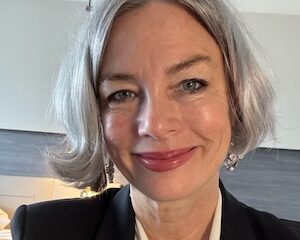Ervin Duggan hired from FCC to lead PBS
As PBS’s fourth president, FCC member Ervin S. Duggan, 54, will take the lead of public TV at a time when momentous developments seem near.
 The field’s biggest ventures beyond single-channelhood are just ahead, along with the high promise, high cost and high-definition of digital technology. And the stations, at their fall planning meeting in mid-November, appeared ready to begin talking seriously about restructuring for that future.
The field’s biggest ventures beyond single-channelhood are just ahead, along with the high promise, high cost and high-definition of digital technology. And the stations, at their fall planning meeting in mid-November, appeared ready to begin talking seriously about restructuring for that future.
Good thing that Duggan enjoys “that feeling of flying out off the cliff, and floating, and testing my wings,” as he remarked Dec. 1 [1993], at the press conference where his election was announced.
Yet he postponed jumping into several PBS policy controversies until at least Feb. 1, when he reports to work in Alexandria.
“I do not bring a precooked vision or blueprint to the job,” he said. “I believe visions are necessary, but I believe visions have to emerge from the collective institution and not be imposed from above.”
He nevertheless reiterated a few points he has made in the past:
- He said public TV “is the natural place to begin” building an information superhighway, and should have “a place at the table” in the planning.
- He endorsed an “ethic of fairness” from his early days in newspapering that would require balancing individual programs.
- And–passing what may be a litmus-test issue for his new constituents–he opposed a proposal to divert CPB money from stations to national program production.
PBS Chairman Gerald Baliles said the board’s search committee interviewed candidates in telecommunications, education and other fields, and Duggan “came to the top clearly as the person to lead PBS during this important time.”
The committee interviewed eight candidates, according to a PBS source, but extended only one offer — to Duggan — and recommended only one nominee to the PBS Board. The board unanimously elected Duggan on the morning of the press conference — after the Washington Post had printed the news.
Duggan will start work at PBS on Feb.1, after clearing up some pending decisions at the FCC. The job will pay $148,800, which gives him a raise; he earns $115,700 as a commissioner.
In the seven months since Bruce Christensen resigned as PBS president, press reports have featured speculation about other candidates, including such figures as PBS Executive Vice Presidents Jennifer Lawson and Bob Ottenhoff, Sharon Rockefeller and Bill Moyers.
Lawson and Ottenhoff said they advised the search committee that PBS would benefit from hiring a leader outside the field. Lawson said that was why she withdrew her earlier application for the job. At this “very important time in public television’s history,” she said, “I just thought it would be ideal to have someone who wouldn’t be seen as attached to any particular aspect of our work.”
Ottenhoff said he declined to be considered because he thought “the industry needed to reach beyond our normal circle.”
The board’s headhunter, Leeda Marting of Boyden Consulting Corp., asked Moyers about his interest in the job, and he briefly considered it, but withdrew from the race, according to a PBS source. Moyers was not available for comment.
Rockefeller, former CPB chairwoman and now president of WETA-FM/TV, said she didn’t apply for the position and didn’t consider doing so because she wanted to have time to spend with her family.
“Plant that same flag”
Duggan said he had told President Clinton in a letter that he believes “the natural platform for any national information infrastructure would be the infrastructure of public broadcasting, in which this nation has already invested hundreds of millions of dollars.”
TV makes sense as a starting point, he said, because nearly all homes have TV sets and telephones but only 20 percent have computers. And public TV has the track record in noncommercial public service, he said.
He couldn’t say yet exactly what role public TV would play, but he wanted “a place at the table” where policy decisions are made about the infostructure.
Likewise, Duggan said he had no “blueprint” showing how the FCC would give noncommercial media favorable access to the phone companies’ future video dialtone services, but — as he did in his dissent on a July 1992 FCC decision — he backed the principle that they should.
America’s Public Television Stations (APTS) has asked the FCC to reconsider the 1992 decision and grant favorable terms of access. Duggan said he has recused himself from decisions on the petition or any other public broadcasting matters that arise while he remains on the commission.
Duggan looked back at the land-grant colleges in 1862 and the reservation of noncommercial TV channels in 1952 as precedents for allocation of resources. “As we move into these new technologies like video common carriage,” he said, “it seems to me we have to plant that same flag of educational and cultural priority on the public resource.”
“At a time of educational crisis in this country, at a time of a crisis of unity in the country — how we are going to live together as one nation — this is no time to abandon the concept of a national commitment to education and culture and of using public resources to those ends.”
He developed the theme in an address at the Southern Educational Communications Association conference this fall (Current, Nov. 1), when he called for creation of “lanes for public culture on the information superhighway.”
“Ethic of fairness”
In perhaps his strongest statement, Duggan rejected the view — sometimes heard at PBS — that news coverage is adequately balanced if it is balanced across the entire schedule over a period of time rather than in a single program.
He made the point in July as a member of the Twentieth Century Fund Task Force on Public Television. “I think it is quite right to ask whether individual broadcasts are too one-sided and imbalanced,” Duggan wrote in his supplemental comment attached to the task force report. “If we evade such questions, the whole debate over fairness in public broadcasting will erupt again.”
In the press conference, Duggan referred back to Washington Post guidelines setting forth “an ethic of fairness,” which he followed as a young reporter in 1964. “One was that if you write a story in which charges are made against someone, you have an obligation to give them a chance to respond to those charges within the same story, or explain why they are not …”
“That ethic of fairness was built in,” Duggan continued. “It didn’t say that we hoped that over a year of publication people would generally perceive the newspaper to be fair in its coverage.”
“I want public broadcasting to look like America,” with liberals and conservatives and people of many races, he said, adapting a Clinton phrase. “I think what makes television interesting is a clash of ideas. … Public broadcasting should be about that. And conservatives should feel it belongs to them, just as liberals feel it belongs to them. … I don’t think it should be the captive camp of any ideology.”
Asked whether he thought public TV had aired unbalanced programs, he deferred comment: “I am not going to begin the new job that I have by attacking the institution that I am called upon to lead.”
Duggan also dissented from the Twentieth Century Fund report on its recommendation that CPB funds be diverted from stations’ Community Service Grants to national program production. Depriving stations of CSGs was “not the best message to send to local stations” at a time when they face an expensive conversion to digital and high-definition TV, he told reporters.
Ending CSGs also would undermine “the hope for improved local service,” he wrote in the task force report.
Public TV someday may be driven to shift the money, but he doesn’t want that to be its “first strategy.” He’d rather try first to enlarge the available funds.
“A weird feature of my career”
Duggan came out with his riff about flying off of cliffs when a reporter asked him whether he had ever managed anything as big as PBS, with its 350 staffers and $161 million budget.
“I have never been qualified for any job that I have taken,” he admitted, charming at least a few of the assembled reporters. He recalled that he led a small Army unit, right after college, and “got out with my skin on;” became a Washington Post reporter without journalism training; was hired by Lyndon Johnson’s White House to write speeches, “though I had never done such a thing”; and wrote a political thriller novel with Ben Wattenberg (Against All Enemies, 1977), though ditto.
“And so it has been a curious, perhaps weird feature of my career that I have always gone for jobs for which I was inadequately credentialed,” Duggan said. “And that feeling of flying out off the cliff, and floating, and testing my wings, and finding out whether I could do it, seems to be a feeling I hanker for.”
In Washington, he moved from the Post to the White House, to Capitol Hill, where he served as an aide to Sens. Lloyd Bentsen (D-Tex.) and Adlai Stevenson III (D-Ill.), to the Department of Health, Education and Welfare, where he assisted Secretary Joseph Califano, and to the Department of State, where he was on the policy planning staff. With the end of the Carter Administration, he formed a consultancy and wrote for Washingtonian magazine. And in 1990, President Bush appointed him to a Democratic seat on the FCC.
On the commission, Duggan has opposed broadcasts of indecent material before late hours. He told reporters the country is showing signs of “creeping barbarism.” But “censorship is not what I am about,” he said.
“I do not believe the government should be the ultimate arbiter of questions of decency,” he said. “I think that what is called upon is for this whole society to explore how to be civil and how to be civilized.”
At the commission, he said, he has appealed for broadcasters to set their own higher standards. “I don’t think that real estate developers should want to be slumlords. And I don’t think that broadcasters should want to be slumlords of the ether.”
Duggan had his first involvement in public broadcasting as a young aide to Douglass Cater, an assistant to President Johnson. Cater brought together LBJ and the first Carnegie Commission to create a federally funded CPB.
Even then, Duggan said, the political forces against public broadcasting were formidable. “It has always confronted an ideology that I refer to as free-market fundamentalism. And that is the belief that the free market can somehow magically produce every social good and that there is no need for an institution for which there is a private commercial counterpart.”






